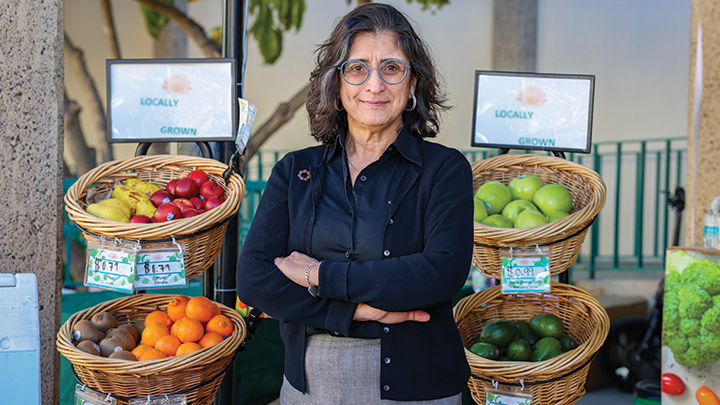Beyond willpower: Making healthy eating habits irresistible
SDSU researcher Guadalupe X. ‘Suchi’ Ayala's innovative strategies and cultural insight transformed dietary practices in underserved communities and beyond.

Forget about willpower if you want to make and maintain healthy eating habits.
Tipping the scale in your favor is far less about an individual’s ability to resist temptation and more about strategies that promote produce in accessible, affordable, and irresistible ways to consumers, especially in underserved communities and food deserts.
Guadalupe X. “Suchi” Ayala, professor at San Diego State University’s School of Public Health and the 2024 recipient of SDSU’s highest research award, the Albert W. Johnson Research Lectureship, has led decades of intervention research on the topic.
“I come from a family of academics with a strong sense of social justice and the importance of education,” said Ayala. “Both my parents and my brothers have PhDs, so this honor is meaningful to me and a testament to my family and community.”
Ayala earned two master's degrees in experimental psychology and health promotion and a doctoral degree in clinical health psychology. It was a recipe for success that landed her on the front lines of translational research, with a focus on health disparities in underserved and predominantly Latino communities in Imperial and San Diego Counties.
“Ultimately, my goal is prevention of diseases, to promote healthier options in a culturally and contextually relevant way,” Ayala explained. “It’s a whole contextual approach that starts long before deciding what to eat.”
Based on her research findings, Ayala determined that neighborhood markets, local restaurants, and even fast food chains are pivotal in steering dietary preferences and making it easier or harder for consumers to choose healthy fruits and vegetables, especially in food deserts.
Ayala and her team partnered with small to medium-sized local grocery stores to replace unhealthy snacks with enticing fruits and vegetables and strategically placed produce within kids’ reach and conveniently located near the checkout counter.
Those simple environmental adjustments had remarkably swift results. According to the project’s outcome data, produce sales immediately increased among store customers. More intervention research soon followed with a focus on addressing childhood obesity.
Ayala teamed up with local restaurants, adding fruit and vegetable options to kids' menus. Several local school districts implemented wellness policies discouraging unhealthy beverages and snacks while promoting healthier options. Community and recreational gardens began to spring up in food deserts.
“It was clear that contextual, cultural, multidisciplinary, and multi-systemic approaches worked better than singular approaches,” Ayala said. “Our data showed meaningful improvements in health outcomes in chronic illnesses, including obesity, diabetes, and asthma, wherever these multilevel strategies were implemented.”
The profound impact of Ayala’s work is far-reaching, said Elva Arredondo, SDSU professor of psychology and one of several colleagues who nominated Ayala for the AWJ award. Arredondo noted Ayala’s research on parenting strategies for reducing childhood obesity has been translated into several languages and adopted internationally.
At the same time, Ayala's roots remain deeply embedded in Imperial County, a place she said profoundly shaped her life when she moved there at age seven.
Her father, Reynaldo Ayala, took a professorship at what was then San Diego State College’s Imperial Valley campus in the 1960s, marking the beginning of a lifelong affiliation with the community and the university.
“It was a deliberate choice that he and my mother made,” said Ayala. “They instilled in me the importance of nurturing cultural and linguistic diversity, and the understanding and love for our community, particularly among immigrants.”
The formative experience still drives Ayala’s leadership and systemic approaches to improve health, or, as she describes it, “advancing the evolution of promoting healthy habits.”
As the director of SDSU’s Institute for Behavioral and Community Health (IBACH) and co-director of SDSU’s HealthLINK Center for Transdisciplinary Health Disparities Research, Ayala continues to foster interdisciplinary collaboration to address complex health disparities.
“Suchi’s success in forging strong community relationships and leading collaborative research projects is something that all researchers can look to as an example,” said Hala Madanat, SDSU’s vice president for research and innovation and previous AWJ recipient. “She truly represents the best of what we can be as university researchers and is incredibly deserving of the Albert W. Johnson distinction.”
The Albert W. Johnson Research Lectureship award is accompanied by a $30,000 research support grant and the lifetime title of distinguished professor. At the March 13 award ceremony at Tula Community Center, Ayala will present a lecture titled “The Evolution of Promoting Health through Partnerships.”
Members of the university community and the public are invited to RSVP for the lecture and awards ceremony.



